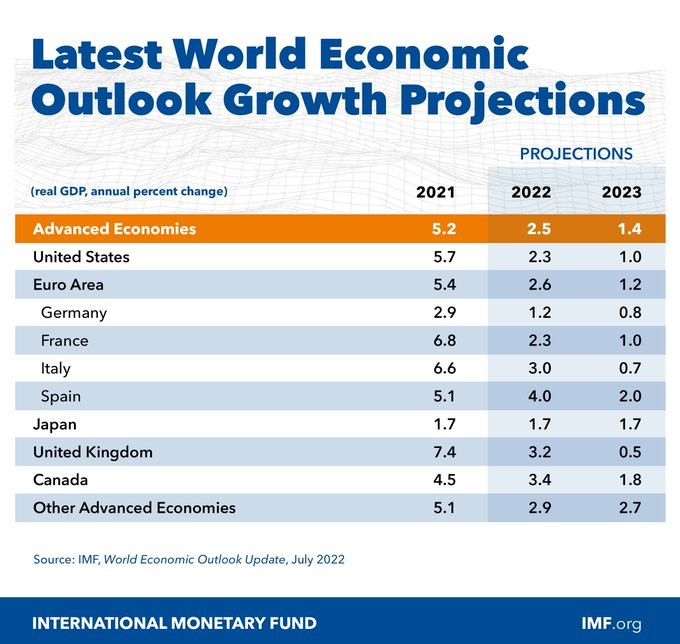02 Feb World Economic Outlook Report 2023
World economic outlook report 2023
This article covers “Daily current affairs for UPSC “and the topic is ‘World economic outlook report 2023″ which is in the news, it covers the “Indian economy” In GS-3, and the following content has relevance for UPSC.
For Prelims: About IMF, reports published by IMF
For Mains: GS-3, concerns associated with the report, Indian economy
Why in the news:
The January update of the World Economic Outlook was released by the International Monetary Fund (IMF).
About IMF
The International Monetary Fund (IMF) is a membership-based institution with 190 member nations. The most influential nations in the global economy are represented on the IMF’s executive board in proportion to their financial weight.
Functions of IMF
- Financial Assistance: The IMF lends money to member nations experiencing balance of payments issues in order to bolster economic growth conditions, replenish foreign reserves, and stabilize currencies. The implementation of structural adjustment programs is required, and the IMF will oversee them.
- IMF keeps an eye on the global monetary system and the 190 nations that make up its membership’s economic and financial policies.
- The IMF flags potential stability risks and offers guidance on necessary policy adjustments as part of this process, which occurs both globally and in specific nations.
- Capacity Development: It offers technical support and instruction to central banks, finance departments, taxing bodies, and other financial entities.
Reports published by IMF
- World Economic Outlook
- Global Financial Stability Report
- Fiscal Monitor
- External Sector Report
Concerns associated with the World Economic Outlook Reports
It provides analyses of short- and long-term changes in the world economy. The international economy is discussed at length in each chapter, including concerns that affect industrialized nations, emerging nations, and economies that are transitioning to the market. Each chapter also addresses hot-button issues of the day. Aside from updating it twice a year in January and July, the IMF releases the WEO twice a year in April and October. Important conclusions from the most recent World Economic Outlook update
Global expansion
According to the forecast, global growth would reach 3.1 percent in 2024 after falling to 2.9 percent in 2023. The prediction for 2023 is 0.2% higher than that of October 2022, although it is still below the long-term average of 3.8%. The war in Ukraine and rising interest rates continue to have a negative impact on the economy.
Inflation
- Global inflation is predicted to decline from 8.8% in 2022 to 6.60% in 2023 and 4.30% in 2024, still above pre-pandemic levels of roughly 3.50% (2017–19).
- There are two key causes for the decreasing price increase.
- global monetary tightening: As a result of slower inflation caused by higher interest rates, consumers are less likely to spend money overall.
- Prices of several commodities, including gasoline and non-fuel, have decreased from their most recent highs as a result of waning demand.
Asia
The analysis predicts that growth in emerging and developing Asia would increase to 5.3% and 5.2%, respectively, in 2023 and 2024, following a more severe than anticipated decline to 4.3 percent that can be attributed to China’s economy in 2022.
Indian Scenario According to World Economic Outlook Reports
The expected growth for the Indian economy for the upcoming fiscal year is 6.1%, down from 6.8% for the current fiscal year that ended on March 31.

World Economic Outlook Growth Projection
Concerns on World Economic Outlook
- The crisis in Ukraine could worsen, China’s bad health results could hinder recovery, and debt distress could get worse as a result of increasing global financing costs.
- In addition, bad news about inflation may cause financial markets to quickly reorder their priorities, and growing geopolitical fragmentation may stymie economic expansion.
Recommendations related to World Economic Outlook
- Despite the current problem in the cost of living, preserving continuous deflation remains a top issue in most economies. Given the potential effects that tighter monetary conditions and slower growth may have on financial and debt stability, the employment of macroprudential instruments and the strengthening of debt restructuring regimes are necessary.
- Accelerating the COVID-19 immunization program in China would safeguard the recovery and have positive cross-border consequences.
- Broad-based fiscal relief programs ought to be stopped, and financial aid ought to be properly directed to those who will be most affected by the rise in food and energy prices.
- Stronger multilateral cooperation is needed to protect the advantages of the rules-based international system, lower greenhouse gas emissions, and boost green investment.
Source:
Download the PDF now:
Daily Current Affairs for UPSC
Plutus IAS Current Affairs provides the latest news on the various aspects of the world economy. So, get one of the best daily current affairs for the UPSC examination from Plutus IAS free of cost. Also, collect the weekly, and monthly current affairs for IAS exam preparation.




No Comments